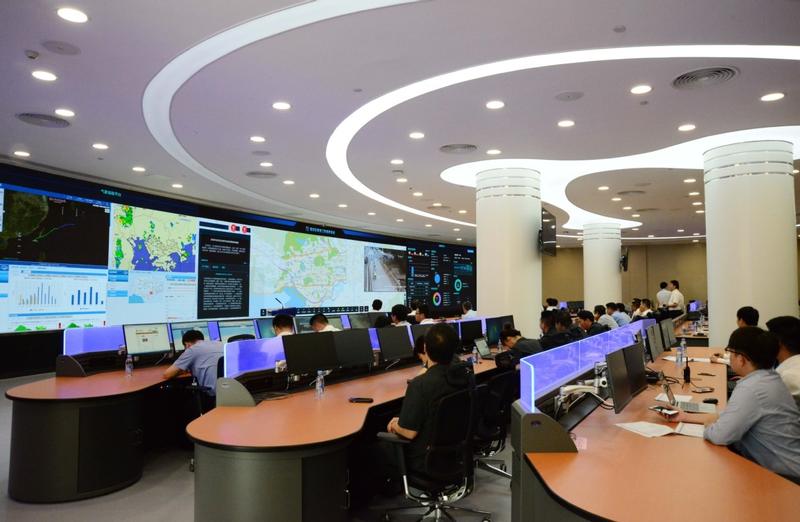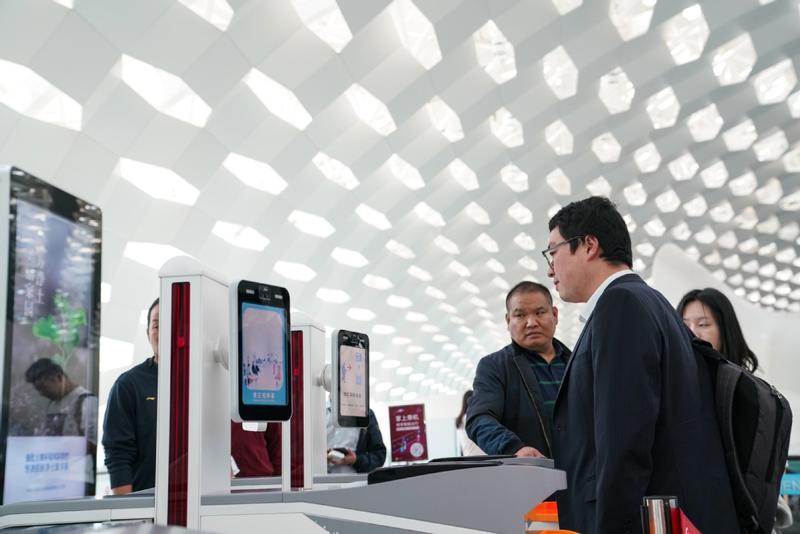 Employees monitor various developments in the city at the Futian Smart City Command Center in Shenzhen, Guangdong province. (PHOTO / XINHUA)
Employees monitor various developments in the city at the Futian Smart City Command Center in Shenzhen, Guangdong province. (PHOTO / XINHUA)
Shenzhen's intelligent e-government services have played an integral role in the fight against the COVID-19 onslaught and have become a unique advantage for its business environment.
The digital platform was able to be set up within a limited time due to the technology hub's unique model of modern government services it has established in recent years
It opened an emergency self-declaration system in early February and more than 20 million users have uploaded their health statuses so far. Its novel health quick response code has become an essential tool to guarantee safety for individuals traveling around the city in Guangdong province.
It also launched tracing maps of confirmed infected patients, infrared readouts that track people movements, 24-hour online medical consultations and a designated section to assist firms with business recovery strategies on an official mobile app-i-Shenzhen.
The digital platform was able to be set up within a limited time due to the technology hub's unique model of modern government services it has established in recent years.
The app boasts more than 7,000 types of services offered by municipal departments and district governments. It has so far recorded about 14 million downloads and more than 6 million registered users.
The app also features 15 digital licenses and certificates, including identification cards and social security cards, and personal information is protected through blockchain technology.
These services are not simply moved from offline to online, but also digitalized in order to speed up application approval efficiency. Its cutting edge e-government services platform supports about 200 projects that can be approved online in just one second, which means citizens can get virtually immediate confirmation.
 A passenger uses facial recognition for identity authentication at the boarding gate of the Shenzhen Baoan International Airport. (PHOTO / XINHUA)
A passenger uses facial recognition for identity authentication at the boarding gate of the Shenzhen Baoan International Airport. (PHOTO / XINHUA)
"Individual industrial and commercial household registrations used to take about two to three working days, and agency fees were around 500 yuan (US$71.94) if needed," said Ou Xiqin, a citizen who successfully received his license through Shenzhen's e-government platform.
ALSO READ: Fashion brands embrace digital tech to counter epidemic impact
"But this time it took me about 15 minutes to fill in the information. Two minutes later, I received a confirmation text message and the license was ready for downloading and printing," Ou said.
Shortening processing times is major upside for residents, but the essential structure underlying the system is a completely automatic examination and approval mechanism of various processes without involving any human intervention, said an official at Shenzhen's government service data administration bureau.
He said the successful operation of the mechanism depends on institutional reforms, meaning condensing processes and reorganizing government departments through advanced technology-like big data-is the best way to deliver such results.
The system was first adopted in 2018 and quickly included an increasing array of services, and it is expected to be promoted nationwide soon.
According to government statistics, about 95 percent of the city's administrative licensing applications are conducted online, ranking Shenzhen the top among major Chinese cities.
As the 5G network covers all areas of the city, the government has set up 12 pilot projects of 5G e-government services including medical services, transportation, education, urban management, tourism and the internet of things.
The internet-based operating may seem to lack a human touch, but Shenzhen's unique model of government service also helps connect people.
In Nanshan district, a hub of many technology giants, such as Tencent and drone maker DJI, have set up small but fully functional offices in residential communities so that individual requirements can be met within short walking distances.
As for enterprises, in-house staff are assigned to large-sized companies and one-stop services are provided to startups in lobbies of shared office buildings.
READ MORE: Digital tech boosts Johnson & Johnson's new-age HR drive
The district government will present gift packages called "entrepreneur boxes" for new startups as a show of appreciation.
Meanwhile, the government will also update the information of tax administration, banks, social security, and other related systems, once registration is completed.


